This Was The Real Purpose Of Futurama's Body-Switching Algorithm
It's no secret that the writers of "Futurama" are major nerds. If you don't know what we mean, go back and watch just one episode of the show closely. Then, you will understand. The whole series, from toe to tip, is chocked full of nerdy references, and we aren't just talking about the obvious nods to things like "Star Trek" and "Dune."
No, the "Futurama" writing staff is also the other type of nerd — the intellectual nerd. They love math and science as much as Bender loves himself, and that's saying something. As a result, you can find no shortage of jokes involving high-level math and science concepts, most (if not all) of which are presented accurately. Altogether, the writing team shares three PhDs, seven Master's Degrees, and more than 50 years of cumulative study at Harvard (via Slate), making them some of the brainiest cartoon writers in history.
However, no episode is better at boasting their big brains than Season 7, Episode 10, "The Prisoner of Benda." While writing the episode, the writing team actually devised an original mathematical theorem. The purpose of this theorem, according to executive producer David X. Cohen, was to write their way out of a serious story issue.
Futurama wrote itself into a corner
In a 2013 interview with Wired, David X. Cohen discussed some of the ways in which "Futurama" writers involve their nerdy passions. In addition to all the coded background jokes written in alien languages, Cohen also discussed their love of math, and how it saved them while writing "The Prisoner of Benda." In that episode, the Planet Express Crew becomes trapped in each others' bodies after they discover that The Professor's new body-swapping machine cannot reverse the effects of a swap it has already performed. In other words, if Fry and Bender switch bodies, then they can't switch back without taking a detour through some un-swapped bodies first.
"We just introduced the concept that the machine can't switch back, purely as a way of making the plot more complicated, Cohen said. "We weren't initially thinking about the mathematics of it. But then we started to run through the plot... And we started thinking, 'oh my God, is this even possible. Can it be done?'"
By the end of the episode, the majority of the show's cast are stuck in different bodies with no idea how to get back to their original meat-sack. Absolutely stumped, the crew calls up the Harlem Globetrotters (who, in "Futurama," are a race of highly intelligent, basketball-loving aliens) to help devise a mathematical answer to this puzzle. In the real world, however, the writers had to solve this self-made conundrum independent of the Globetrotters' help.
Futurama writer Ken Keeler comes in for the rescue
Thankfully, the writing team did come up with a mathematical solution to the issue they created, and it's all thanks to one of the show's other writers and executive producers, Ken Keeler. Keeler holds a PhD in Applied Mathematics, so with a little bit of time and know-how in the field of Group Theory, he developed an actual equation, known as "the Futurama Theorem" or "Keeler's Theorem," that resolved their issue. It proves that as long as they have two new bodies, any group of swapped individuals can get back to their original bodies by swapping with the new individuals and then making a series of calculated swaps through other bodies to get back (via Math Goes Pop!).
"It is probably the first time a mathematical theorem has been proved in a television script," David X. Cohen told the German publication SerienJunkies. "So this is probably our proudest math moment in 'Futurama.'"
Once that was proven mathematically, the "Futurama" team was able to finish the episode with everyone back in the right bodies — even the company wash bucket. Meanwhile, in our world, Keeler got a cool equation named after him for all of his trouble. Oh, and he also won a Writer's Guild of America Award for it, so there's that too.


